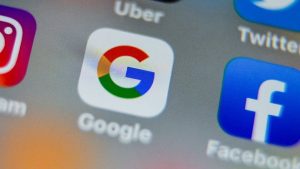With the ever-increasing use of technology in our daily lives, there is growing concern about the security of one’s personal data. The tech companies store the personal data of its users, and that data can range from one’s date of birth to one’s banking details. Many of the websites and mobile applications do not even disclose that they may be collecting user’s data. The big tech companies are using their technologies to gather information about its users. Through these technologies they monitor the behavior of their users or how the user uses a certain gadget. This monitoring and gathering of data of individuals by private companies is often referred to as surveillance capitalism. This data is then transformed into precious commodity and sold to other companies.

https://thehill.com/sites/default/files/styles/article_full/public/google_facebook_082819getty.jpg?itok=yHHWxa6a
Tech companies like Facebook and Google collect and store the user’s data, they collect the user’s search and browsing history, they are reading the contents of your emails, contents of chats, the person’s location history, the way a person uses his mobile phone or a computer, the interests of a person, where the person likes to shop, and which place the person goes often, and their artificial intelligence software programs can read the posts, the contents the user shares, and what the user likes to frequently talk about, so that they can show content in the ads related to the user’s recent searches and according to their interests. This all information is very precious for large businesses as they try to learn the consumer habits and develop products and services based on consumer requirements, or even promote their own products by showing ads based on person’s recent search history. Online platforms, in spite of their innocent-sounding name, are a way of optimizing the overlap between the domains of social interaction and profit (Couldry, 2016). Our data is constantly being collected in numerous ways. These companies can even track how many seconds a user hovers over an online advertisement. Facebook, on its platform shows ads related to the pages a user likes and the user’s search history over the internet. These companies often buy and sell its user’s data to other advertisement companies so that they can make ads according to the user’s interests and show ads to individuals according to their interests. Bruce Schneier says, “The primary business model of internet is built on mass surveillance” (Couldry, 2016). Without gathering data and understanding the behavior and interests of people, it would be impossible for advertisement companies to show ads according to user’s interest and they could never find out what an individual is thinking to purchase. For advertisement companies, online ads are more effective and brings them more consumers for the product or service they have advertised about compared to the television advertisements or advertisements in the print media. Data brokers, or companies that buy and sell information on customers, have risen as a new industry alongside big data. For businesses that are capturing large amounts of data, this represents an opportunity for a new stream of revenue (Uzialko, 2018).

https://content.fortune.com/wp-content/uploads/2017/03/lis-03-15-17-company-surveillance.jpg
The email service providers often use tools that can scan the emails and read the contents of anyone’s personal email and if the email contains information about any product or service then that email service provider will then display ads related to the service or product mentioned in the email. Another way in which companies gather a user’s data is by tracking the user’s location, they gather how frequently a person visits a certain place or tracks the locations of the retail outlets the individual visits. By tracking locations, they can show ads related to the stores in the neighborhood and about the stores the user visits frequently. In each of these scenarios, the user received something in return for allowing corporation to monetize their data. The core products of Facebook and Google, like, Instagram, Messenger, Gmail, Google Maps don’t cost money. You pay with your data which is used to target you with ads (Matsakis, 2019). These all companies collect data in different ways so that they can show ads curated to the individual’s interests. The voice recognition technology has gained popularity in a very less time and now there are gadgets and devices available that can recognize a voice and do tasks only when the voice which has already been set on that device tells the device to do the task. There are home automation gadgets which can turn on lights and turn on and turn off electronics at home, and some of them operate on instructions only after recognizing the specific voice which is set up on the device. The software programs like Siri and Cortana can just be used without opening them manually from the phone screen but by just saying “Hey Siri”, or “Hey Cortana” to their mobile phone or the laptop device and the window pops up and the user can ask them to do tasks for them, this means the microphone is always on which is not good for any person who is very cautious about their privacy. This makes it even easier for hackers if they want to target a specific individual and listen to any conversation the individual might be having, the microphone which hears all the time even when the phone is locked is always harmful. Data brokers are also valuable resources for abusers and stalkers. Doxing, the practice of publicly releasing someone’s personal information without their consent, is often made possible because of data brokers (Matsakis, 2019).
Many electronic companies analyze the way a user uses their product, they analyze how a user taps and fumbles smartphone, how and what applications a user uses in their laptop, how and when they use headphones etc. And this information is normally gathered so that the companies can improve their products and services and understand what a user needs and how a user feels more comfortable using a specific product so that the companies can bring changes in the newer products and services and drive more consumers towards their products. Personal data is also used by artificial intelligence researchers to train their automated programs. Every day, users around the globe upload billions of photos, videos, text posts, audio clips to sites like YouTube, Facebook, Instagram, and Twitter. That media is then fed to machine learning algorithms, so they can learn to “see” what’s in a photograph and or automatically determine whether a post violates Facebook’s hate-speech policy (Matsakis, 2019).
As data capture and analytics technologies become more sophisticated, companies will find new and more effective ways to collect and contextualize data on everything, including consumers (Uzialko, 2018). But in my opinion, collecting data is not as bad as it might seem as long as it is for advertisement purposes only, because these companies are only trying to figure out what makes me and thousand other people like me to choose to buy a particular type of car and when, and then sell that information to a firm that sells cars. The data about me is useless unless combined in that way, and it is data that I could not possibly sell on my own (Chace, 2019). It is only bad if the government starts its mass surveillance and starts spying on people. Therefore, the government needs to make stronger rules that limits these tech companies to collect data of its users and disclose the information to its users every time they collect data and ever time its sold to other companies or if they have utilized that data for any other purpose or give a periodic report to its users about where the company has used the data of its users.
References:
Chace, Calum. (2019, September). Surveillance Capitalism and Anti-Capitalism.
Retrieved from https://www.forbes.com/sites/cognitiveworld/2019/09/17/surveillance-capitalism-and-anti-capitalism/#7d0d8da22984
Couldry, Nick. (2016, September). The price of connection: ‘surveillance capitalism’.
Retrieved from https://theconversation.com/the-price-of-connection-surveillance-capitalism-64124
Matsakis, L. (2019). The WIRED Guide to Your Personal Data (and Who Is Using It).
Retrieved from https://www.wired.com/story/wired-guide-personal-data-collection/
Uzialko, Adam. (2018, August). How Businesses Are Collecting Data (And What They’re Doing with It).
Retrieved from https://www.businessnewsdaily.com/10625-businesses-collecting-data.html

Leave a Reply